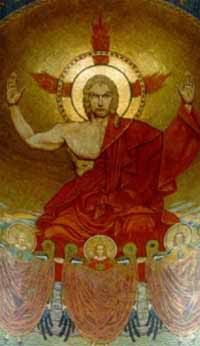Quick muslim primer

Muslims treat the Quran as their Bible, and they see Muhammad the way Christians view Jesus Christ, right? Wrong, Muslim leaders insist; in fact, it's just the opposite.
Muslims see the Quran as God’s final revelation, roughly comparable to the way mainstream Christians see Jesus as the living word and God’s ultimate revelation, said Alif Rahman, who teaches an outreach class about Islam at the Dallas Central Mosque in Richardson, Texas.
Muhammad is the last in a long line of prophets and the bearer of God’s message, but Muslims do not worship him, Rahman noted. In a sense, he roughly parallels the role many Christians believe the Bible fills, not as an object of worship but the instrument through which God makes his message known.
And while Muslims see Muhammad’s life as exemplary, they do not consider him divine, Rahman emphasized.
“There is no incarnation of God as a human being in Islam,” he said. Islam is built on five pillars of worship that are regulated rituals and five pillars of faith, which are essential beliefs for the faithful.
“It is a religion that has rules and regulations for the individual, the family and society, day and night, every second,” Imam Yusef Kauakci of the Dallas Central Mosque said.
The five pillars of worship are:
-- Shahada. The Muslim confession of faith, repeated as a part of worship, states in Arabic that there is only one God, and Muhammad is his prophet.
-- Salat. Five times daily, Muslims perform formal, ritualized prayer. Bodily positions such as prostration with one’s forehead touching the ground are prescribed at specific points during the ritual.
-- Zakat. Muslims give alms, often understood to be 2.5 percent of their liquid assets and income-producing property, to support charitable causes and the propagation of Islam.
-- Saum. Fasting from dusk until dawn daily during Ramadan, the ninth month of the Islamic calendar, includes refraining from food, drink and sexual intercourse.
-- Hajj. Every Muslim who is physically and financially able makes a pilgrimage to Mecca at least once in his lifetime.
Muslims also hold to five basic beliefs.
-- The oneness of Allah. Kauakci thinks this simple, clear-cut and inclusive view of God, in contrast to Christian teaching about a triune God who must be approached through Jesus Christ, accounts in part for the rapid growth of Islam worldwide.
“Islam is belief in one God, one faith. Before the creation of Adam, Islam was there,” he said. “We accept all messengers as ours. There is one God for the whole universe.”
-- Angels, such as Gabriel. “Rules and regulations are revealed to humans through Gabriel and to the messengers for people to live in, live by, live to and live for,” Kauakci said.
-- The Quran. Muslims believe the Book of God is a heavenly book that was revealed in part through the Jewish and Christian Scriptures but later was corrupted. They believe Gabriel gave the pure word of God -- in Arabic -- to Muhammad as the final prophet in a series of messengers that began with Adam and also included Noah, Abraham, Moses and Jesus.
“Adam came, and Islam was given to him as a guide and to all the messengers who followed. We look at Jesus Christ as a prophet, as our messenger,” Kauakci said.
-- A final day of judgment. “There is a strong accountability in our belief in the day of judgment,” Kauakci said. “We don’t know whether we will be accepted or not. We live between hope and hopelessness. There is no assurance. There is striving.”
-- The sovereignty of God. God is responsible for everything that happens. Nothing can happen outside his will.
link




0 Comments:
Post a Comment
<< Home